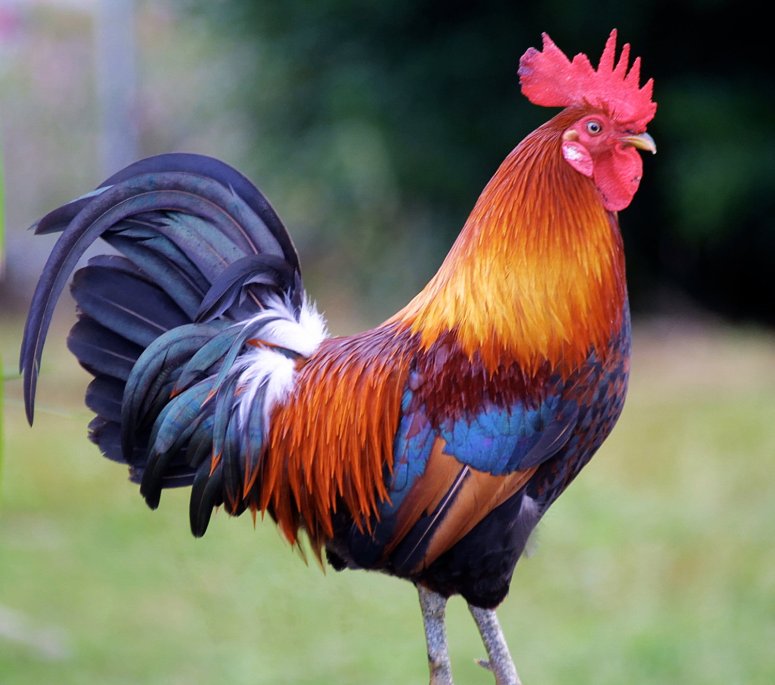
In Mark’s Gospel, Jesus tells Peter that he will deny him three times “before the cock crows twice.” In Matthew’s Gospel he tells him that it will be “before the cock crows.” Well, which is it —before the cock crows once or twice? When I was in college I purchased a book that was intent on reconciling differences of this kind. It was called The Life of Christ in Stereo. The author, Johnston Cheney, took the four Gospel accounts and wove them together into one big mega-Gospel, to show what the real Gospel was like. For the inconsistency in the account of the denials of Peter, the author had a very clever solution: Peter actually denied Jesus six times, three times before the cock crowed and three more times before it crowed twice. [Bart Ehrman, Jesus, Interrupted: Revealing the Hidden Contradictions in the Bible (And Why We Don’t Know About Them). New York: HarperCollins, 2009, pg. 6]
I’ve heard of the seemingly “contradictory” nature of the rooster crows while in Dr. Bart Ehrman’s class as a UNC sophomore, so I’m no stranger to them. And yet, when reading this once more after 15 years, I decided it would be worth bringing to the surface for the sake of readers everywhere. For those who are believers, firmly so, and really want answers to the questions they seek, it is my hope that our coverage of these seeming contradictions will give you hope and renew your faith.
So, let’s get down to the rooster crows and dig to the bottom of this.
The nature of the situation

Mark and Matthew, according to Ehrman, present different accounts of the rooster crows: Mark says that the rooster crows twice (or quotes Jesus as saying that, rather), while Matthew quotes Jesus mentioning the rooster crowing once. What’s important to see is that, in Matthew 26, Jesus says “before the rooster crows.” There is no mention of “once” there, just the event itself (that the rooster will crow).
How do we reconcile the rooster crows from the mouth of Jesus Himself?
Reconciling the rooster crows of Mark 14 and Matthew 26

Mark 14 and Matthew 26 are the passages in question that contain not only Jesus’ quote that Peter would deny Him before the rooster crows but also what actually happens in the Jesus denials. So, in order to make sense of these, let’s look at the passages themselves in detail:
27 Then Jesus said to them, “All of you will be made to stumble because of Me this night, for it is written:
‘I will strike the Shepherd,
And the sheep will be scattered.’
28 “But after I have been raised, I will go before you to Galilee.”
29 Peter said to Him, “Even if all are made to stumble, yet I will not be.”
30 Jesus said to him, “Assuredly, I say to you that today, even this night, before the rooster crows twice, you will deny Me three times.”
31 But he spoke more vehemently, “If I have to die with You, I will not deny You!”
And they all said likewise. (Matthew 14:27-31, NKJV)
66 Now as Peter was below in the courtyard, one of the servant girls of the high priest came. 67 And when she saw Peter warming himself, she looked at him and said, “You also were with Jesus of Nazareth.”
68 But he denied it, saying, “I neither know nor understand what you are saying.” And he went out on the porch, and a rooster crowed.
69 And the servant girl saw him again, and began to say to those who stood by, “This is one of them.” 70 But he denied it again.
And a little later those who stood by said to Peter again, “Surely you are one of them; for you are a Galilean, and your speech shows it.”
71 Then he began to curse and swear, “I do not know this Man of whom you speak!”
72 A second time the rooster crowed. Then Peter called to mind the word that Jesus had said to him, “Before the rooster crows twice, you will deny Me three times.” And when he thought about it, he wept. (Mark 14:66-72)
31 Then Jesus said to them, “All of you will be made to stumble because of Me this night, for it is written:
‘I will strike the Shepherd,
And the sheep of the flock will be scattered.’
32 But after I have been raised, I will go before you to Galilee.”
33 Peter answered and said to Him, “Even if all are made to stumble because of You, I will never be made to stumble.”
34 Jesus said to him, “Assuredly, I say to you that this night, before the rooster crows, you will deny Me three times.”
35 Peter said to Him, “Even if I have to die with You, I will not deny You!”
And so said all the disciples. (Mark 26:31-35)
69 Now Peter sat outside in the courtyard. And a servant girl came to him, saying, “You also were with Jesus of Galilee.”
70 But he denied it before them all, saying, “I do not know what you are saying.”
71 And when he had gone out to the gateway, another girl saw him and said to those who were there, “This fellow also was with Jesus of Nazareth.”
72 But again he denied with an oath, “I do not know the Man!”
73 And a little later those who stood by came up and said to Peter, “Surely you also are one of them, for your speech betrays you.”
74 Then he began to curse and swear, saying, “I do not know the Man!”
Immediately a rooster crowed. 75 And Peter remembered the word of Jesus who had said to him, “Before the rooster crows, you will deny Me three times.” So he went out and wept bitterly. (Matthew 26:69-75)
How do we reconcile “the rooster crows” and “the rooster crows twice”? Bart Ehrman says that we can’t reconcile them, that, taking the historical-critical method seriously, we must presume that the accounts are contradictory. And yet, they aren’t. Mark says that the rooster crows twice, but perhaps Mark’s one rooster crow is the final rooster crow, not the total rooster crows.
Whereas Mark focuses on detailed rooster crows, Matthew opts for only one rooster crow (the second one) because, irregardless of how many rooster crows occur, Peter denies Jesus three times. If Peter denies Jesus three times before the first rooster crow, is it necessary to add a second rooster crow (that occurs after the first crow, where Peter’s denials have already taken place)?
Perhaps the rooster crows are one place where we see that Mark was probably the earliest of the four Gospels (he provides more detail on the rooster crows and the denial scene), whereas Matthew only provides one rooster crow because he wasn’t present when Peter denies Jesus and has to get his details from either Mark (the earliest Gospel), or someone else. It’s likely that Matthew covers the second crow whereas Mark covers the first and second crows, which means that Mark 14 and Matthew 26 can be harmonized.
Conclusion

Summarizing the rooster crow accounts, we can say the crows and details happen like this:
1) Jesus tells Peter that before the rooster crows twice, Peter will deny Jesus (Mark’s Gospel)
2) Peter denies Jesus, at which point the first rooster crow occurs (Mark 14)
3) Peter denies Jesus twice more, at which point the rooster crows again (Matthew 26, Mark 14)
Matthew only refers to the second and final crow, the end of the crowing, whereas Mark covers all of the rooster crowing event itself. This is no different than someone getting a snapshot of the event whereas someone else gets all the little, intricate details.
Matthew’s account has fewer details, but it shouldn’t be deemed contradictory to Mark. After all, Matthew was a disciple but wasn’t there when Peter denies Jesus, and it’s likely that Mark’s Gospel was really Peter’s dictated by John Mark (after all, he refers to a “Mark” as being his “son” in 1 Peter 5:13 in Italy). Despite not being there, he only mentions one rooster crowing — which is true because it happened. Again, nothing about these two accounts are contradictory.
Ehrman mentions the author of a book who attempted to reconcile the two accounts by the name of Johnston Cheney, who said that Peter denied Jesus six times — but the number of denials only perpetuates the problem. I think that approaching the rooster crows and reconciling them as I’ve done above is a far better solution than multiplying the denials. Two rooster crows, rather than six denials, get to the root of the problem.

7 thoughts on ““Before the rooster crows”: reconciling Jesus’ prediction in Mark 14 and Matthew 26”
Comments are closed.